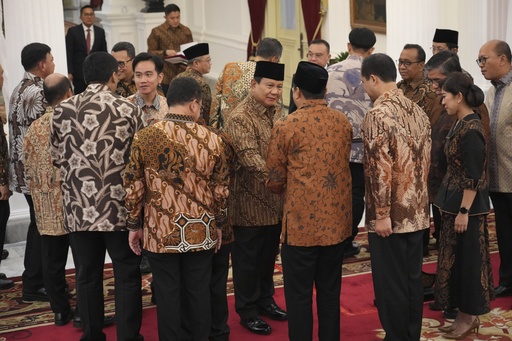
JAKARTA, Indonesia — Following his inauguration, Indonesian President Prabowo Subianto unveiled his Cabinet on Sunday evening, marking it as the largest in the nation’s history with a total of 109 ministers, vice ministers, and heads of national agencies. He has dubbed this diverse assembly the “Red and White Cabinet,” a nod to the colors of Indonesia’s national flag. Subianto officially took office as the eighth president of Indonesia, which is the largest economy in Southeast Asia.
The previous administration under Joko Widodo featured a Cabinet of only 34 members. In light of Subianto’s plans for governance, he stated that a robust and cohesive administration is essential, despite some analysts voicing concerns that his oversized Cabinet may complicate bureaucratic processes. “I wish to build a strong government that brings together our multicultural society and the varied political interests at play,” Subianto remarked prior to conducting over a hundred interviews at his home last week. “It is essential to form a broad coalition, which is why some may perceive my Cabinet as bloated.”
The newly formed Cabinet includes politicians from a coalition of seven parties that backed Subianto’s election victory in February, alongside several members of Widodo’s administration who were retained to carry on their roles. Political experts have interpreted this decision as a reward to Widodo for his underlying support during the election period.
Subianto was inaugurated alongside his vice president, Gibran Rakabuming Raka, a former Mayor of Surakarta and the son of Widodo. The choice of Raka as Subianto’s running mate came with Widodo’s endorsement, indicating a united front despite past political rivalries. Subianto and Widodo had faced off in presidential elections in 2014 and 2019, with Subianto refusing to acknowledge victory after both contests. However, after his reelection, Widodo appointed Subianto as the Minister of Defense, demonstrating an unexpected alliance between the two leaders despite their differing political affiliations. During the campaign, Subianto positioned himself as the inheritor of the outgoing president’s policies, pledging to continue significant initiatives, such as the controversial multibillion-dollar new capital city project and imposing restrictions on raw material exports to foster domestic industry.
With Widodo’s backing, Subianto won the election decisively, promising to maintain the policies that were popular during the previous administration. Notably, Subianto retained nearly half of Widodo’s Cabinet, including Finance Minister Sri Mulyani Indrawati, who has made history by becoming the first finance minister to serve under three presidents. Known for her extensive experience and past roles at the International Monetary Fund and the World Bank, Indrawati is widely respected for her reforms in Indonesia’s taxation framework and her resilient leadership during economic crises, including the global financial downturn and the COVID-19 pandemic.
Indrawati expressed her commitment to collaborating closely with Subianto to enhance the effectiveness of the Finance Ministry and strengthen national fiscal management. Other notable ministers from Widodo’s administration who were retained by Subianto include Interior Minister Tito Karnavian, Trade Minister Zulkifli Hasan, Energy Minister Bahlil Lahadalia, and Minister of State-Owned Enterprises Erick Thohir.
As he begins his presidency, Subianto has ambitious plans, aiming to boost annual economic growth to 8% by the conclusion of his five-year term. His administration is set to introduce a significant spending program that encompasses an increase in defense expenditure, salary raises for civil servants, and a plan to provide free meals to 83 million children throughout the nation.
